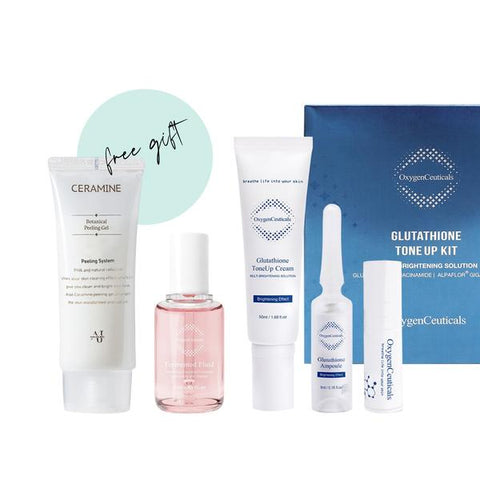All About Glutathione: The Secret To Skin Brightening
Glutathione is an antioxidant that has been hotly debated and too-often misunderstood as a skincare ingredient. This little tripeptide deserves a lot of credit when it comes to anti-aging properties and treating hyperpigmentation, and we are here to clear up some common misconceptions and assumptions. Let’s get into it:
How to Pronounce Glutathione?
In terms of difficulty, pronouncing Glutathione correctly on the first try is like an 11/10 - really tough. So, what is the proper way to say it? "GLOO-TAH-TAI-ON"
You can watch Joy pronounce it properly (and multiple times) in this video:
What is Glutathione?
Let’s talk science: Glutathione is a tripeptide created in your liver out of three (hence tripeptide) acids: glutamic acid, glycine, and cysteine. Normally, glutathione works as an antioxidant that protects the body from disease and deterioration. Because glutathione helps generate old cells into new ones, when used topically as a skincare ingredient it actually works to reverse the aging process. Having higher levels of Glutathione in your body and in your skin means improved cell turnover and protection from skin damage caused by pollution and sun exposure, both leading causes of premature aging. Gluthatione supports your body’s collagen and elastin to keep your skin supple and help reverse that damage from external sources.
Related: Collagen for Skin: All You Need To Know
Why is Glutathione So Popular?
In addition to its antioxidant-based anti-aging properties, Glutathione has been found to have anti-melanogenic properties which means that it has the ability to inhibit the melanin-producing enzyme, tyrosinase. Melanin is the pigment that determines the color of our skin. While this is not the original use of Gluthathione, it has become one of the leading uses for this skincare ingredient because a great number of people suffer from hyperpigmentation due to aging, hormone variable stages in life like pregnancy or menopause, or sun damage. With the anti-aging and anti-melanogenic properties combined, it’s easy to see why this is a highly sought-after ingredient!
Whitening vs. Brightening
Because Glutathione has such effective anti-melanating properties, some people use it to lighten their overall skin tone, both on face and body. However, this is not the purpose of Glutathione in skincare, as it is intended to benefit those who have legitimate pigmentation issues that need to be addressed. There is a difference in the skincare world with the terms “whitening” and “brightening.” Whitening is, exactly what it sounds like, and refers to the lightening of skin for cultural and/or social-economic purposes. Brightening, however, refers to the evening-out of one's hyperpigmented skin-tone, as well as the “tone-up effect” glow that comes from using Glutathione as a product. It is the “brightening” and “tone-up” that Team Eunogo is after when we research and vet our skincare products.
Glutathione vs. Niacinamide
What is the difference between these two skincare ingredients that both claim to provide a brightening effect? As we discussed previously, Glutathione is an antioxidant formed by the body to help anti-aging as well as having anti-melanating properties. Niacinamide is also a highly-effective brightening agent, but is a form of Vitamin B3, and it naturally boosts cellular repair and energy. When applied topically, it also helps keep your skin healthy and can additionally be used to treat skin conditions like rosacea and tighten pores, while Glutathione is mainly used for skin brightening and its protective effects for the skin.
Should You Try It?
First things first, skincare is the key to supplementing Gluthathione in one’s body. Studies show that humans do not absorb glutathione very well orally, and those same IV infusions/ injections mentioned above do not have any official medical governing body approval. Moreover, Glutathione given through IV may only stay in your system for a few hours, rendering it expensive but useless. Suffice to say, most of the oral or IV methods that claim to dramatically lighten skin tones do not work.
Transdermal (applying the medicine/ingredient through the skin) formulations, however, allow your skin to absorb the maximum amount of glutathione and get ongoing benefits. Because Glutathione naturally occurs in your body the likelihood of an adverse reaction is low, but can happen. When preparing to use skincare with Glutathione as an active ingredient, please be sure to always do a patch test of the product on your inner arm first. Once you’ve done your patch test safely, you’re free to start your journey to an even skin tone!
Our Top Glutathione Picks:
1. OxygenCeuticals Glutathione ToneUp Kit
2. OxygenCeuticals Age Defying Caviar Cream
3. Korean Skin Brightening Kit



